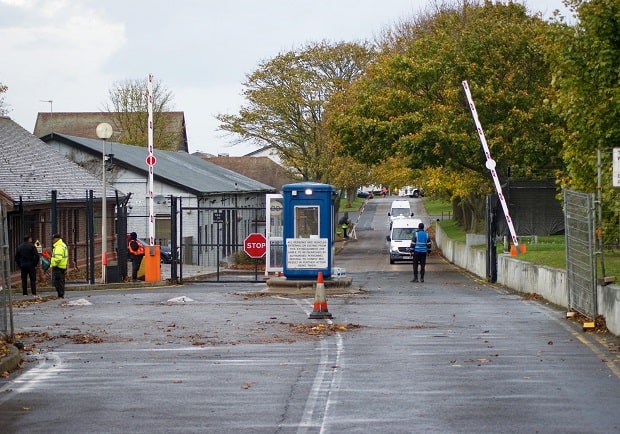
A delegation from the Council of Europe’s Committee for the Prevention of Torture and Inhuman or Degrading Treatment or Punishment (CPT) has carried out a “rapid reaction visit” to the Manston processing centre.
Seven committee members made the visit, which was approved by the Home Office, from 25 to 28 November.
The CPT organises visits to places of detention to assess how persons deprived of their liberty are treated. Places visited include prisons, juvenile detention centres, police stations, holding centres for immigration detainees, psychiatric hospitals and social care homes.
CPT delegations have unlimited access to places of detention, and the right to move inside without restriction. They interview persons deprived of their liberty. After each visit, the CPT sends a detailed report to the State concerned.
A CPT statement on the visit to Manston and facilities in Dover says: “The main objective of the visit was to examine the treatment of foreign nationals arriving by small boat in the United Kingdom after crossing the English Channel.
“The delegation visited Western Jet Foil and Manston Short-Term Holding Facility where all such persons are processed and held during the first 24 hours of their arrival in the country. The delegation also visited the Kent Intake Unit in Dover where unaccompanied and separated minors are treated upon their arrival.
“At the end of the visit, the delegation presented its preliminary observations to Rt Hon Robert Jenrick, Minister of State for Immigration, and Donald Smith, Director for Operations at the Clandestine Channel Threat Command (CCTC) at the Home Office.”
The CPT report has not been published as yet.
The centre was designed to process up to 1,600 people over a 24/48 hour period. However, a high number of small boat Channel crossings this Autumn and a firebomb attack at the Dover Home Office facility which necessitated the move of 700 people saw numbers at Manston soar to 4,000. All those at the centre were moved out to accommodation by November 22.
The Public and Commercial Services union claimed that the rapid removal of people out of the centre came after the union, Detention Action and a woman held at the facility issued legal action against Home Secretary Suella Braverman.
At a meeting last week Thanet councillors were told the Manston processing centre was undergoing a deep clean and adjustments – which reportedly include new flooring in the marquees and additional mattresses – while the site was empty. The Home Office has not stood down the facility.
The centre has been in the spotlight following cases of diphtheria and other illnesses, concerns over conditions and the holding of some people for up to a month.
On November 16 a letter from the Independent Monitoring Boards to the Chairs of the Home Affairs, Women and Equalities, Justice and the Joint Committee on Human Rights said Kent members had carried out monitoring visits throughout October and November.
The Kent report said the centre was not equipped to deal with people beyond the 24 hour limit and despite best efforts of staff, the sheer number of people being held at that time resulted in a “deterioration of conditions.”
The IMB recommends the Home Office:
- Ensure that length of detention at Manston does not exceed the 24-hour limit, and therefore that there are adequate contingency plans to accommodate significant numbers of arrivals.
- Provide those detained at Manston with information on how long they will be detained at the centre and how their claim will be processed.
- Ensure that conditions for those detained at Manston meet basic standards of safety and decency, and in particular that arrangements safeguard the most vulnerable.
- Ensure that there are sufficient healthcare staff on-site to screen arrivals to identify urgent healthcare needs and prevent the spread of contagious disease.
- Work to mitigate the risk of contamination at Manston by improving cleanliness and hygiene on-site.
- Ensure that every individual detained at Manston is provided with adequate bedding, clean clothes and means for washing.
A Home Office spokesperson told The Guardian newspaper: “We take both the welfare of those in our care and our wider public health responsibilities extremely seriously. We work closely with the NHS and UKHSA to support individuals affected by infection and limit transmission, as well as ensure information is shared in a timely way and that everyone leaving facilities such as Manston is given access to appropriate treatment.
“We have robust contingency plans to deal with health issues such as communicable diseases. The Council of Europe’s request for a visit to Manston was granted by the Home Office.”

